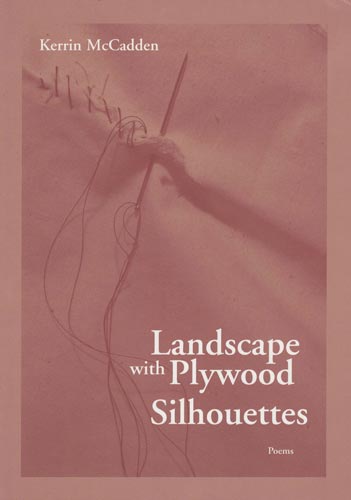Landscape with Plywood Silhouettes
Lyrical, honest, descriptive, Landscape with Plywood Silhouettes by Kerrin McCadden is a thoughtful meditation on wandering through a human landscape, one full of loss and desire. Often elegiac, this collection of poetry accepts the world before it, acknowledging the quotidian value of our lives while also seeing the beauty in it. Lyrical, honest, descriptive, Landscape with Plywood Silhouettes by Kerrin McCadden is a thoughtful meditation on wandering through a human landscape, one full of loss and desire. Often elegiac, this collection of poetry accepts the world before it, acknowledging the quotidian value of our lives while also seeing the beauty in it.
The collection opens on “Becca,” a young woman who tattoos on her back, “Make of my life a few wild stanzas.” In these poems, we are to read the people as a text, as a language that makes a permanent mark on landscape. In the way Becca inks her skin, she also wants to make a record of her life. McCadden, though, reminds us of our inevitable deaths and closes the poem watching Becca swim away: “[. . .] the tattoo flashing with each stroke, / and there is barely enough time to read it.” We are in love with Becca in this poem, and then we lose her, out of sight, and far from reach.
In this collection, McCadden asks us to consider our own capacity for pain, our ability to face loss and resurface from grief. These poems are lonely and tender, longing for an answer larger than life. McCadden even attempts to offer a field guide to this questioning with poem titles such as “Safety Instructions,” “How To Miss a Man,” and “Ways To Say Goodbye.” In a personal favorite poem, “Love Poem Not for a Husband,” the poet guides us through town and shows us, despite all this loss, why we fall in love with people. She writes:
Some days I am a mouth on a fish swimming
and swallowing the stream of things in front of me.
That old man—he is in my way, and I fall in love.
She then continues a few stanzas later:
in love over and over. It does not matter. I stop a woman
by the firehouse. We swap news and I bend over her stroller.
The baby reaches for me, and so I pick her up. She dissolvesinto a cloud of commas, washes down my legs and I coo
apologies to her mother, who has always known, she says,
that her little girl was just a series of pauses, waiting.
The extended metaphor of the fish swallowing the world is an image that has remained with me long after reading this collection, as well as “She dissolves // into a cloud of commas.” Is there anything more lovely? There is something simple and tender about language and landscape. We use language to translate our experiences, while it seems our landscapes shape us more than we might be willing to admit.
Many of the poems in Landscape with Plywood Silhouettes beckon me to return to the first page and read again. In “My Brother Sits for a Life Drawing Class” the speaker describes her brother posing in front of the students who paint his body as a landscape. She then collects the paintings and creates a gallery in her home, aware that she will lose him and wanting to hold onto him in some way. McCadden allows the poem to develop slowly and methodically so that we too feel her loss of him by the last line.
In later poems, McCadden is imaginatively playful. She describes the ghost girl in her house as a child and she does so with adoration. In a different piece, a cut out gorilla goes missing at the local Domino’s Pizza. I love these gestures to the odd happenings of our lives.
The poems in Landscape with Plywood Silhouettes made me want to linger between lines and within stanzas. They were the landscapes of human lives, raw with faults, and all so lovely. Read this book slowly. In fact, read it several times. It will be worth the journey.





